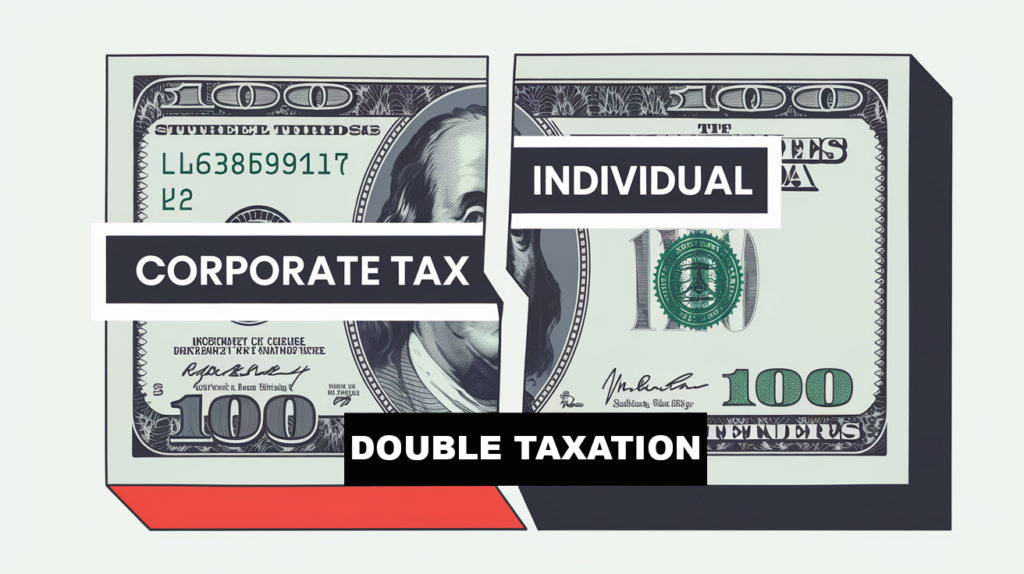As a business owner, optimizing your tax strategy is always a top priority. One concept that often causes confusion, especially for C corporations (C corps), is “double taxation.” At XOA TAX, we’re well-versed in the complexities of the tax code and can guide you through this potentially challenging aspect of business taxation. Let’s explore what double taxation means for C corps in 2024.
Key Takeaways:
- Double taxation happens when corporate profits are taxed first at the corporate level and then again at the shareholder level when distributed as dividends.
- C corps face double taxation, unlike S corps and partnerships, which have pass-through taxation.
- The corporate tax rate for 2024 is a flat 21%.
- Strategies like deductions, reinvesting profits, and reasonable compensation can help mitigate the impact of double taxation.
Breaking Down Double Taxation
Imagine your C corp earns $100,000 in profit. First, the corporation itself pays taxes on that income at the current corporate tax rate of 21%. That’s $21,000 in federal taxes. Next, you decide to distribute the remaining profit to shareholders as dividends. Here’s where the “double” comes in – those dividends are taxed again on your individual income tax returns.
How Dividends are Taxed
It’s important to distinguish between qualified dividends and ordinary dividends. Qualified dividends are typically taxed at lower capital gains rates, while ordinary dividends are taxed at your regular individual income tax rate.
For 2024, the tax rates on qualified dividends are:
- 0% for taxpayers in the 0% and 15% ordinary income tax brackets.
- 15% for taxpayers in the 25%, 28%, 33%, and 35% ordinary income tax brackets.
- 20% for taxpayers in the 39.6% ordinary income tax bracket.
Why C Corps Face Double Taxation
C corps are treated as separate legal entities from their owners. This distinction offers benefits like liability protection but also means the corporation is taxed independently. When those profits are passed on to shareholders, they’re considered personal income and are taxed accordingly.
Strategies to Minimize the Impact
While double taxation is a reality for C corps, you have options to lessen its effect:
- Maximize Deductions: The tax code offers numerous deductions for businesses. Take advantage of every eligible deduction, such as operating expenses, depreciation, and employee benefits, to reduce your corporation’s taxable income.
- Reinvest Profits: Instead of distributing all profits as dividends, consider reinvesting them back into the business. This not only fuels growth but also defers taxes on those profits.
- Reasonable Compensation: If you’re both a shareholder and an employee, ensure your salary aligns with industry standards. This shifts some profit from dividends (taxed twice) to salary (taxed once as personal income).
- Explore Other Structures: If double taxation is a major concern, it might be worth exploring other business structures like S corporations or partnerships, which typically avoid double taxation through pass-through taxation. However, each structure has unique advantages and disadvantages, so careful consideration is key.
FAQ about Double Taxation in 2024
Q: Are all corporations subject to double taxation?
A: No. Only C corps face double taxation. S corps, partnerships, and LLCs (unless they choose to be taxed as a C corp) are pass-through entities. This means profits and losses are “passed through” to the owners and reported on their individual tax returns.
Q: Is double taxation always a disadvantage?
A: Not necessarily. While double taxation can increase your overall tax burden, C corps offer other benefits, such as liability protection.
Q: Can I switch my C corp to an S corp to avoid double taxation?
A: Yes, it’s often possible to convert from a C corp to an S corp. However, there are specific requirements and potential tax implications, so it’s crucial to consult with a tax professional before making any changes.
Need Expert Advice?
Tax laws are complex and ever-changing. At XOA TAX, we can help you understand the intricacies of double taxation and develop a tax strategy that aligns with your business goals. Contact us today for a personalized consultation.
Website: https://www.xoatax.com/
Phone: +1 (714) 594-6986
Email: [email protected]
Contact Page: https://www.xoatax.com/contact-us/
Disclaimer: This post is for informational purposes only and does not provide legal, tax, or financial advice. Laws, regulations, and tax rates can change often, and vary significantly by state and locality. This communication is not intended to be a solicitation and XOA TAX does not provide legal advice. Please consult a professional advisor for advice specific to your situation.




 anywhere
anywhere  anytime
anytime